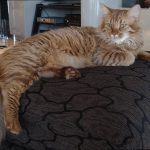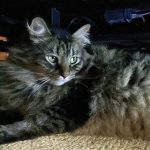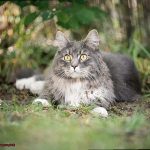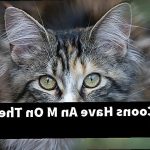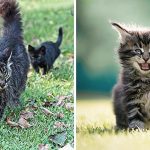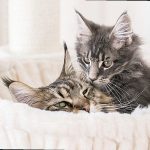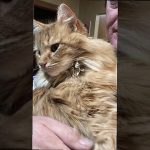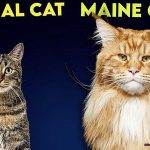Welcome, fellow Maine Coon cat lovers. If you’re wondering about the ideal feeding frequency for your majestic feline friend, you’ve come to the right place. As we all know, Maine Coons are not only known for their larger-than-life personalities but also their immense love for good food. But how often should you feed them? Well, it’s not a simple answer as it depends on several factors such as age, weight, activity levels, and overall health.
So let’s dive into this topic together. In this blog post, we’ll explore everything there is to know about how often Maine Coon cats should eat. We’ll discuss the best types of food to give them and expert tips on feeding schedules and portion sizes. We’ll also highlight the importance of keeping your furry friend hydrated.

Whether you’re a new pet parent or an experienced one looking to brush up on your knowledge, this post has got you covered. So grab a cup of coffee (or tea) and get ready to learn how to keep your Maine Coon cat healthy and happy through proper feeding habits.
Feeding Frequency for Adult Maine Coons
As someone who has extensively studied Maine Coon cats, I am often asked about the best feeding frequency for these magnificent felines. Adult Maine Coons are known for their high metabolism and require more calories than many other domestic cat breeds. Therefore, it is essential to provide them with the right amount of food at the appropriate intervals throughout the day.
In general, adult Maine Coons should be fed two to three times a day, with each meal consisting of 200-300 calories. Dividing their meals up into equal portions will ensure that they receive enough nutrition without overeating or becoming obese. However, it is important to note that feeding frequency may vary depending on the cat’s age, weight, and activity level.
Older cats may require smaller meals spread out throughout the day to prevent digestive problems, while overweight cats may need to be fed smaller portions more frequently to help them lose weight. Feeding too much can lead to various health issues such as diabetes, joint problems, and respiratory problems.
It is crucial to monitor your Maine Coon’s food intake as they are prone to obesity. Avoid giving them extra treats or table scraps as this can quickly add up in calories and contribute to weight gain.
Besides regular meals, fresh water should always be available for your Maine Coon to drink. Dehydration can lead to various health problems like urinary tract infections and kidney disease. It is recommended that you have multiple water sources throughout the house and change the water frequently.
Feeding Frequency for Kittens
Feeding frequency is a crucial aspect of their overall health and well-being, and it’s important to get it right. Your kitten needs a high amount of calories to support their growth and development, so feeding them frequently throughout the day is essential.
Research suggests that Maine Coon kittens should be fed 3-4 times a day until they are around six months old. After that, you can gradually transition them to two meals a day. Keep in mind that individual needs and activity levels may vary, so consult with your veterinarian for personalized recommendations.
Small, frequent meals are better for your kitten than one or two large meals. This helps prevent overeating and obesity, which can lead to health problems later in life. As majestic creatures with a high metabolism, Maine Coons need careful monitoring of their food intake to avoid issues like diabetes, joint problems, and respiratory problems.
Choosing the right food is equally important for your kitten’s nutrition. Opt for a high-quality kitten food that is specifically formulated for their nutritional needs. Look for protein as the first ingredient and avoid fillers and artificial additives. Your kitten requires all the nutrients possible to grow up strong and healthy.
Fresh water is another crucial aspect of your kitten’s diet. Maine Coon kittens are prone to dehydration, so make sure they have access to clean water at all times throughout the day.
How Much Food Should be Given at Each Feeding?
This can be tricky, as overfeeding can lead to obesity and underfeeding can cause malnutrition. Luckily, there are guidelines you can follow to ensure your cat is getting the nutrients they need.
First and foremost, the amount of food your Maine Coon cat requires will depend on their age, weight, and activity level. As a general rule, it’s recommended to feed them 2-3 times per day. Each meal should consist of 1/4 to 1/3 cup of high-quality dry food or 2-3 ounces of wet food.
But be warned: Maine Coon cats tend to overeat and pack on the pounds. To prevent this, monitor their food intake and adjust accordingly. If your cat is gaining weight, cut back on their portion sizes. Similarly, if they’re losing weight or seem lethargic, it may be time to increase their meals.
Treats can also contribute to overeating and weight gain. While giving your cat a treat here and there is fine, too many can be harmful. Offer them in moderation to avoid any health issues.
Lastly, it’s important to consult with a veterinarian about your cat’s specific needs and preferences. They can help determine the appropriate portion sizes for your furry friend based on their unique requirements.
Avoiding Overfeeding and Obesity-Related Health Problems
When it comes to Maine Coon cats, their big appetites can be hard to resist. But overfeeding can lead to a range of obesity-related health problems, including diabetes, heart disease, and joint issues. As an expert on Maine Coon cats, I’m here to help you avoid overfeeding and keep your feline friend healthy and happy.
The most critical step in preventing overfeeding is selecting the right type of food for your cat. High-quality cat food that is formulated specifically for Maine Coon cats is key. Opt for food that is protein-rich and free from fillers or carbohydrates that could cause weight gain. And, as much as they may beg, don’t give in to table scraps.
Establishing a feeding schedule that fits your Maine Coon cat’s age and activity level is also crucial. Rather than one large meal, try feeding your cat two or three smaller meals throughout the day. This not only prevents overeating but also supports healthy digestion.
Portion control is equally important when it comes to feeding your Maine Coon cat. Use a measuring cup or scale to ensure you’re giving them the appropriate amount of food for their size and activity level. Keep in mind that kittens require more food than adult cats, so adjust accordingly.
It’s also best to avoid using food as a reward or treat for your Maine Coon cat. Over time, this can lead to overeating and associated health problems. Instead, show affection through playtime or cuddles.
Benefits of a Regular Feeding Schedule
A consistent feeding routine provides several benefits that contribute to their overall happiness and longevity.
Firstly, a regular feeding schedule helps maintain your cat’s weight and prevent overeating. By feeding your cat on a schedule, you can avoid overfeeding at one sitting or grazing throughout the day, which can lead to obesity-related health problems. This will keep your cat healthy and happy, with fewer visits to the vet.
Secondly, a regular feeding schedule can help prevent digestive issues. Cats are known for having sensitive stomachs, and inconsistent feeding patterns can cause digestive upset and discomfort. A consistent feeding routine ensures that your cat’s digestive system runs smoothly, reducing the likelihood of hairballs, vomiting, and other digestive problems.
Thirdly, a regular feeding schedule can also promote good behavior in your Maine Coon. Cats are creatures of habit, and when they know when to expect their meals, they are less likely to beg or act out in other ways for food. This can help create a calmer and more peaceful environment in your home. Plus, it helps establish a routine for your cat’s other daily activities such as playtime and rest.
Lastly, regular feeding schedules can also help you monitor your cat’s health. If you notice changes in your cat’s eating habits or appetite, it could be an indication of an underlying health issue. By maintaining a consistent feeding schedule, you are better able to monitor your cat’s eating habits and detect any potential health problems early on.
Ensuring Access to Fresh Water at All Times
One key aspect of their well-being is access to fresh water at all times. In this informative article, we’ll share some valuable tips and tricks on how to guarantee that your beloved feline has constant access to clean, fresh water.
Firstly, consider investing in a water fountain. Cats are naturally attracted to moving water, and a fountain can encourage them to drink more. It’s not just an attractive source of hydration, but it also helps keep the water circulating, which ensures freshness and cleanliness. With a wide range of water fountains available in the market, you’re sure to find one that fits your Maine Coon’s needs perfectly.
Secondly, having multiple sources of water throughout the house is another great way to ensure your Maine Coon always has access to fresh water. You can place bowls in different rooms or even on different floors of the house. By doing so, you not only provide your cat with ample hydration but also encourage them to move around and stay active.
Cleanliness is crucial when it comes to your cat’s water bowl. Bacteria can grow in stagnant water, which can harm your cat’s health. Therefore, it’s recommended that you wash the bowl with soap and hot water every day or every other day. This ensures that your Maine Coon is drinking clean and fresh water every time.
Lastly, monitoring your cat’s water intake is essential for their overall health and well-being. If you notice that your cat is drinking less water than usual or showing signs of dehydration such as lethargy or dry mouth, it may be a sign of an underlying health condition. In such cases, promptly consult with a veterinarian.
Common Mistakes in Feeding Maine Coon Cats
Maine Coon cats are majestic creatures that are known for their friendly and sociable personalities. However, as a responsible pet owner, it is important to take care of their nutritional needs to ensure they stay healthy and happy. Unfortunately, there are several common mistakes that cat owners make when feeding their Maine Coon cats. In this article, we will discuss these mistakes and how to avoid them.
Mistake #1: Overfeeding Your Cat
Maine Coon cats have a love for food that can sometimes lead to overeating. However, overfeeding your cat can cause serious health issues such as obesity, joint pain, diabetes, and heart disease. To prevent this mistake, monitor your cat’s weight and adjust their food intake accordingly. Speak with your veterinarian to determine the appropriate amount of food for your Maine Coon cat based on their age, weight, and activity level.
Mistake #2: Feeding Your Cat an Inappropriate Diet
It is tempting to give your Maine Coon cat human food or a diet that is not specifically formulated for their breed. However, this can lead to nutrient deficiencies and health issues in the long run. To avoid this mistake, provide your Maine Coon cat with a high-quality cat food that contains all the necessary nutrients they need. Look for cat foods that are specifically formulated for Maine Coon cats or large breed cats.
Mistake #3: Not Providing Enough Water
Maine Coon cats are notorious for drinking less water than other breeds, which can lead to dehydration and urinary tract issues. To avoid this mistake, encourage your cat to drink more water by placing multiple water bowls around your home and considering wet food options that contain more moisture. Also, be sure to clean their water bowl daily to prevent bacteria growth.
Tips for Establishing a Healthy Feeding Routine
Maine Coon cats are one of the largest domesticated cat breeds. They require a specific feeding routine to maintain their health and weight, and it’s crucial to establish a healthy feeding schedule for your furry feline friend.
Here are five tips for creating a healthy feeding routine for your Maine Coon cat:
Stick to a Schedule
Feeding your Maine Coon cat at the same time every day helps them feel secure and regulates their appetite. Consistency is key when establishing a feeding routine for your cat.
Measure the Portions
Overfeeding can lead to obesity and other health issues in cats. To prevent this, measure out the portions of your cat’s food according to their weight and age.
Your veterinarian can advise you on the appropriate amount of food for your cat.
Provide Fresh Water
Access to fresh and clean water is just as important as providing food for your Maine Coon cat. Make sure their water bowl is always clean and filled with fresh water.
Choose High-Quality Food
Feeding your Maine Coon cat high-quality food is essential for their health. Look for cat food that is specifically formulated for their breed and age, and check the ingredients list for high-quality protein sources.
Offer Treats in Moderation
Treats can be a great way to reward your Maine Coon cat, but they should be offered in moderation. Too many treats can lead to weight gain and other health issues, so it’s important to limit how many treats you give your cat.
Conclusion
Feeding your Maine Coon cat may seem like a simple task, but it requires much more than just putting food in their bowl. To ensure that your feline friend stays healthy and happy, you need to consider several factors such as their age, weight, activity levels, and overall health.
Adult Maine Coons should be fed two to three times a day, while kittens require more frequent feeding throughout the day to support their growth and development. However, portion control is key to preventing overeating and obesity-related health problems. Choosing high-quality cat food that is specifically formulated for Maine Coon cats can help maintain their weight and prevent nutrient deficiencies.
Establishing a regular feeding schedule can also promote good behavior and prevent digestive issues. Furthermore, providing access to fresh water at all times is crucial for your cat’s well-being. Consider investing in a water fountain or placing multiple bowls around the house to encourage drinking and ensure cleanliness.
